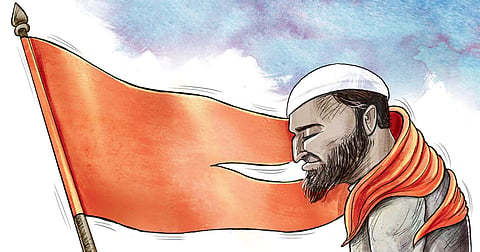

So ideology isn’t the BJP’s monopoly, it seems. The last few days have placed that impossible-to-define ideology, secularism, at the centre of the political crisis in Maharashtra. The ironies arising from this are many.
Secularism is the one idea the BJP has tried its best to demolish right from the late 80s. But L K Advani’s contribution notwithstanding, the current BJP-run Central government has been far more determined to render obsolete this defining feature of our country than the government headed by Advani-Vajpayee.
Also ironic is the arena where this battle of ideologies is being played out. Maharashtra holds special significance for the BJP, not just for the number of Lok Sabha and Assembly seats it has, but also because it’s known as the land of Shivaji Maharaj and “Phule-Shahu-Ambedkar”. (Shahu Maharaj, ruler of Kolhapur from 1894-1922, introduced 50% reservation in government jobs for backward class candidates.)
Maharashtra was also the home of 19th century reformers Ranade-Agarkar-Gokhale-Pandita Ramabai, and later of Gandhian socialists, ranging from Yusuf Meherally, S M Joshi and Madhu Limaye, to Mrinal Gore and George Fernandes (before he switched loyalties). The slain rationalist Narendra Dabholkar was part of this tradition. Then there were the legendary communists: founder of the CPI S A Dange, and the CPM’s Godavari Parulekar and Ahilya Rangnekar.
It is this tradition that never lets the RSS get power, though the organisation was founded in Nagpur, with its top leaders hailing from the state, from founder Hedgewar to Golwalkar to Savarkar to Mohan Bhagwat. I haven’t forgotten the elation of a senior RSS/BJP functionary as he spoke of a near-certain BJP sweep, for the first time in the 2014 Assembly polls. More than the prospect of power, what he relished was the defeat of Maharashtra’s much-vaunted progressive tradition.
The third irony is the party that has prevented government formation in the state. The BJP has had little problem with the Lohiaite Nitish Kumar, whose political career started in the JP movement. It is the Congress, the party that’s increasingly being defined as hollowed out id-eologically, that has made ideology the pivot of its hesitation to tie-up with the BJP’s oldest ally—and the only one to openly share its Hindutva ideology.
But here’s perhaps the biggest irony. Even as Sonia Gandhi worries about the dent in her party’s “secular” image if she supports a party founded by Bal Thackeray, in Maharashtra, especially in Mumbai that saw the worst riots after the demolition of the Babri Masjid, politically active Muslims and secularists are rooting for a Sena-NCP-Congress alliance.
And it’s not only to keep the BJP out. The Muslim-Shiv Sena relationship started changing after the party came to power in 1995. Many factors are responsible, all of them ironically linked with the Congress. Muslims found the Sena a change from the Congress in many unexpected ways. The party’s corporators and MLAs were both accessible and willing to work for them, even though they knew Muslims hadn’t voted for them. The community got long-pending demands, ignored by the Congress, resolved during the five years that Thackeray held the remote control of the state. This period saw only one minor communal riot, which was swiftly controlled. In power for the first time, and soon after the 92-93 riots, the Sena was keen to break its rioter image.
The current Sena president has been a major factor in this change. Muslims who know Uddhav Thackeray claim he is not anti-Muslim, and dismiss his sporadic inflammatory remarks as appeasement of the Sena’s old constituency.
But even Uddhav’s “mild” persona wouldn’t have been enough had the Congress-NCP not alienated Muslims in their 15-year reign. The euphoria among Muslims when the Sena-BJP government was defeated in 1999 vanished by 2014. The ruling Congress-NCP combine’s dogged refusal to punish the guilty of the 92-93 riots, specially policemen; its neglect of educational facilities for the community; and most important, the arrest of innocent Muslims across the state on terror charges, saw Asaduddin Owaisi’s party win two Assembly seats in its very first try in 2014.
Today, you remind Muslims about Bal Thackeray’s documented role in the 92-93 riots, and they turn around and ask which party was in power both at the Centre and the state then, who was the defence minister camping in the city while it burnt.
In the 2019 Lok Sabha polls, many Muslims urged Uddhav not to ally with the BJP. It was only when he expressed his reluctance to go against his MLAs’ wishes that they went back to their original patron. But the Congress won just one Lok Sabha seat, and seemed to be in deep slumber right till the Assembly elections six months later. Like the party’s Central leadership, Muslim activists too wrote off the Congress.
In fact, the very visible presence of Muslims in the rallies of Shiv Sena candidates during the Assembly campaign led one Muslim worker to wonder wryly whether the BJP would emerge as the party for the Hindus and the Sena the party for the Muslims, given the near wipe-out of “secular” parties in the State!
But with Maharashtra’s silent voters having breathed life into the “secular” parties, and the Shiv Sena at last free of the BJP, is it surprising that many Muslims and some secular activists are rooting for this strange combine? With the BJP to reckon with, how to define who is “secular” here, and who is “communal”?
Jyoti Punwani
Freelance journalist based in Mumbai
Email: jyoti.punwani@gmail.com